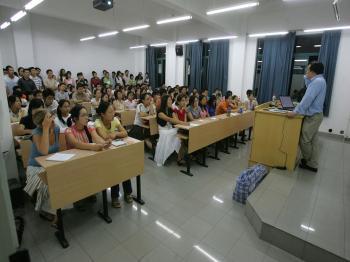In China the national entrance exam for admission to university has been considered an almost sacred rite of passage that each year decides the fates of another class of students.
In today’s China, though, this exam is increasingly becoming compromised by cheating, part of a general trend that afflicts China’s entire higher education system.
Take the case of the exam administered last year in Songyuan, a small town in Northeast China’s Jilin Province where systematic, almost public cheating used high-tech methods that have been favored in recent years.
According to investigative reporting by the China Youth newspaper, in Songyuan the equipment students used to cheat with was sold at 5,000 yuan (US$747), and the transfer of exam answers was sold separately, at 16,000–40,000 yuan (US$2,391–$5,978), with the final cost depending on how high the resulting scores were.
Prior to the exam, ads for “exam devices” were posted in public places in town, and two teachers were involved in selling the devices, making 800,000 yuan (US$119,572) in a few days. Exam candidates received phone calls to their homes just like telemarketing calls.
Also in Songyuan, old-style copying was taken to a new height. The student who was cheating would pay another student to copy his or her exams; the monitoring teachers were often paid as well. The cost of one exam can range from 3,000 to 50,000 yuan (US$448–$7473).
Monitoring teachers do not dare interfere fearing the students will retaliate. In 2008, a monitoring teacher in Songyuan was beaten up by a student’s parents for enforcing exam rules.
Not all copying was arranged well in advance. The China Youth report described a student, ranked second in his class, having his exam ripped away from him by another student to copy — he was unable to finish the exam.
The authorities in Songyuan confirmed 29 cases of cheating, with six using surrogates, and the rest using high-tech devices. Fifteen people were arrested for selling the devices.
The number of cases of cheating confirmed by the authorities does not seem to match the scope of the cheating reported by China Youth. Payoffs to officials and the high level of technology used in cheating may explain the discrepancy.
Continued on the next page...
In today’s China, though, this exam is increasingly becoming compromised by cheating, part of a general trend that afflicts China’s entire higher education system.
Take the case of the exam administered last year in Songyuan, a small town in Northeast China’s Jilin Province where systematic, almost public cheating used high-tech methods that have been favored in recent years.
According to investigative reporting by the China Youth newspaper, in Songyuan the equipment students used to cheat with was sold at 5,000 yuan (US$747), and the transfer of exam answers was sold separately, at 16,000–40,000 yuan (US$2,391–$5,978), with the final cost depending on how high the resulting scores were.
Prior to the exam, ads for “exam devices” were posted in public places in town, and two teachers were involved in selling the devices, making 800,000 yuan (US$119,572) in a few days. Exam candidates received phone calls to their homes just like telemarketing calls.
Also in Songyuan, old-style copying was taken to a new height. The student who was cheating would pay another student to copy his or her exams; the monitoring teachers were often paid as well. The cost of one exam can range from 3,000 to 50,000 yuan (US$448–$7473).
Monitoring teachers do not dare interfere fearing the students will retaliate. In 2008, a monitoring teacher in Songyuan was beaten up by a student’s parents for enforcing exam rules.
Not all copying was arranged well in advance. The China Youth report described a student, ranked second in his class, having his exam ripped away from him by another student to copy — he was unable to finish the exam.
The authorities in Songyuan confirmed 29 cases of cheating, with six using surrogates, and the rest using high-tech devices. Fifteen people were arrested for selling the devices.
The number of cases of cheating confirmed by the authorities does not seem to match the scope of the cheating reported by China Youth. Payoffs to officials and the high level of technology used in cheating may explain the discrepancy.
Continued on the next page...



